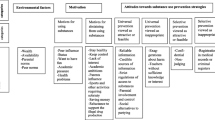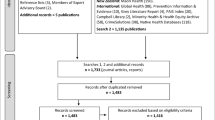Abstract
This text describes a psychosocial intervention about alcohol and drugs among adolescents from an indigenous community in Roraima-Brazil. We consider that, although fermented beverages are part of rituals of different indigenous ethnic groups in the country, the excessive consumption of alcohol among them is worrisome, given the increase of chemical dependency, social vulnerability and other aggravations. The intervention was developed in two stages: (a) production of a community diagnosis, putting the demand under analysis, raising interventional possibilities, potentialities and resources available in the community, and (b) conducting weekly conversation rounds, focusing on health education and harm reduction, training members to detect different modalities of use and planning future intervention strategies. Conclusively, it points out the important role played by psychology in the context of indigenous peoples when it combines community and scientific knowledge. It also points to the need to expand our theoretical and practical bases in similar contexts.
Access this chapter
Tax calculation will be finalised at checkout
Purchases are for personal use only
Similar content being viewed by others
Notes
- 1.
Due to the variety of meanings that “intervention” may include, it is necessary to politically demarcate that we share the concept that intervention in community contexts should value the protagonism of the peoples or groups involved, valuing respect for their autonomy and not constituting an invasive movement or simply coming “from the outside in”. This perspective and the ethical-political foundations that underpin it are presented in detail later in the methodological section of the text.
- 2.
Here, when considering the perspective that alcohol use is culturally, socially and historically peculiar to each community, we refrain from using expressions such as “alcoholism” or “alcohol dependence”, as we understand that they still sustain and support a primarily biomedical interpretation. In its place, highlighting the relational and processual character of such phenomenon, we understand that the expression “alcoholization process” synthesizes this other broader and contextual perspective (Souza & Garnelo, 2006; Neves, 2004).
- 3.
As a screening instrument, the scores obtained from responses to AUDIT items allow the classification of substance use in different levels: if up to 7 points are computed, it is understood that the subject’s relationship with alcohol is of low risk; scores between 8 and 15 points are indicative of risk use; in cases where the answers add up to 16 to 19 points, it would be cases of harmful use of alcohol; finally, there would be the classification of cases of probable chemical dependence, when AUDIT responses add up to 40 points. According to the application protocol itself, from the identification of the risk zone, it becomes possible for the professional to offer personalized orientations, focused on the pattern of consumption.
References
Afonso, M. L. M., & Abade, F. (2008). Para reinventar as Rodas. Rede de Cidadania Mateus Afonso Medeiros (RECIMAM).
Baremblitt, G. (1996). Compêndio de Análise Institucional e outras correntes: teoria e prática (3ª ed.). Rosa dos Ventos.
Barros, R. B. (2001). Intervenção psicossociológica. In M. N. M. Machado et al. (Eds.), Psicossociologia: análise social e intervenção (pp. 116–169). Autêntica.
Brasil. Fundação Nacional de Saúde. (2002). Política Nacional de Atenção à Saúde dos Povos Indígenas (2ª ed.). Ministério da Saúde.
Barreto, I. F., Dimenstein, M., & Leite, J. F. (2020). Processos de alcoolização entre povos indígenas da América Latina. Alcoholization processes among indigenous people in Latin AmericaIvan. Revista Ciências em Saúde, 10(1), 45–51. https://186.225.220.186:7474/ojs/index.php/rcsfmit_zero/article/view/861/523
Bort Júnior, J. (2014). SOUZA, Maximiliano Loiola Ponte de (org.). 2013. Processos de Alcoolização Indígena no Brasil: perspectivas plurais. Rio de Janeiro: Editora FIOCRUZ. 252 p. Campos – Revista de Antropologia, 15(1), 169–174. https://doi.org/10.5380/campos.v15i1.43065
Branco, F. M. F. C., & Vargas, D. (2017). Processo de alcoolização - reflexões de problemas relacionados ao consumo em comunidades indígenas. Journal of Nursing UFPE on line, 11(2), 718–723. https://ds.saudeindigena.icict.fiocruz.br/handle/bvs/1313
Coimbra, C. E. A., Jr., Santos, R. V., & Escobar, A. L. (2003). Epidemiologia e Saúde dos Povos Indígenas no Brasil. Fiocruz-ABRASCO.
Conselho Federal de Psicologia. (2019). Referências técnicas para atuação de psicólogas(os) com povos tradicionais. CFP-CREPOP.
Ferreira, A. B. H. (2004). Novo Dicionário Eletrônico Aurélio. Editora Positivo.
Ferreira Neto, J. L. (2008). Intervenção psicossocial em saúde e formação do psicólogo. Psicologia & Sociedade, 20(1), 62–69. https://doi.org/10.1590/S0102-71822008000100007
Gomes-Medeiros, D., et al. (2019). Política de drogas e Saúde Coletiva: diálogos necessários. Cadernos de Saúde Pública, 35(7). https://doi.org/10.1590/0102-311X00242618
Dantas, C. M. B., Dimenstein, M., Leite, J. F., Torquato, J. L., & Macedo, J. P. (2018). A pesquisa em contextos rurais: desafios éticos e metodológicos para a psicologia. Psicologia & Sociedade, 30, e165477. https://doi.org/10.1590/1807-0310/2018v30165477
Filho, J. R. A. (2019). Das “coisas jogadas fora”: ensaio sobre um estágio em Psicologia Social e Processos Comunitários. Pesquisas e Práticas Psicossociais, 14(3). Retrieved from: http://seer.ufsj.edu.br/index.php/revista_ppp/article/view/e3372/2178#
Freitas, M. F. Q. (1998). Inserção na comunidade e análise de necessidades: reflexões sobre a prática do psicólogo. Psicologia: Reflexão e Crítica, 11(1), 175–189. https://doi.org/10.1590/S0102-79721998000100011
Guimarães, L. A. M., & Grubits, S. (2007). Alcoolismo e violência em etnias indígenas: uma visão crítica da situação brasileira. Psicologia & Sociedade, 19(1), 45–51. https://doi.org/10.1590/S0102-71822007000100007
Hermano, B. M. (2013). Bebendo entre amigos: um estudo antropológico sobre uso de bebidas alcoólicas na casa de apoio à saúde indígena de Roraima (Dissertação de Mestrado em Antropologia). Universidade Federal de Pernambuco.
Langdon, E. J. (2007). Diversidade cultural e os desafios da política brasileira de saúde do índio. Saúde e Sociedade, 16(2), 7–9. https://doi.org/10.1590/S0104-12902007000200002
Lopes, L. P., & Nascimento, A. R. A. (2016). O Que Faz Uma Psicologia Social? Intervenção Na Psicologia Social Brasileira. Psicologia & Sociedade, 28(1), 14–25. https://doi.org/10.1590/1807-03102015aop002
Méndez, E. B. (1999). Uma versão brasileira do AUDIT- Alcohol Use Disorders Identification Test (Dissertação de Mestrado). Universidade Federal de Pelotas, Pelotas. Retrieved from: http://www.epidemioufpel.org.br/uploads/teses/Brod%20Mendez%201999%20Dissert.pdf
Menéndez, E. (2013). Prefácio. In M. L. P. Souza (Ed.), Processos de alcoolização Indígena no Brasil: perspectivas plurais (pp. 65–80). Editora FIOCRUZ.
Moreira Barbosa, V. L. (2012). Facilitando uma Conversa sobre Álcool e outras Drogas – um Convite à Reflexão. Nova Perspectiva Sistêmica, 21 (42), 28–41. https://www.revistanps.com.br/nps/article/view/221
Neiva, K. (2010). Intervenção psicossocial: aspectos teóricos, metodológicos e experiências práticas. Vetor.
Neves, D. (2004). Alcoolismo: acusação ou diagnóstico? Cadernos de Saúde Pública, 20(1), 7–14. https://doi.org/10.1590/S0102-311X2004000100002
Quiles, M. I. (2013). ‘Mansidão de fogo’: aspectos etnopsicológicos do comportamento alcoólico entre os Bororo. In M. L. P. Souza (Ed.), Processos de alcoolização Indígena no Brasil: perspectivas plurais. Editora FIOCRUZ.
Sampaio, J., et al. (2014). Limites e potencialidades das rodas de conversa no cuidado em saúde: uma experiência com jovens no sertão pernambucano. Interface – Comunicação, Saúde, Educação, 18(2), 1299–1311. https://doi.org/10.1590/1807-57622013.0264
Sarriera, J., Silva, M., Pizzinato, A., Zago, C., & Meira, P. (2010). Intervenção Psicossocial e algumas questões éticas e técnicas. In J. Sarriera (Ed.), Psicologia comunitária: estudos atuais (pp. 20–44). Sulinas.
Silva, G. S. (2013). Agroatividade Wapixana na comunidade indígena Canaunim: avanços e ajustes em contato com outras culturas (1960–2010). (Dissertação Mestrado em Sociedade e Cultura na Amazônia), Universidade Federal do Amazonas.
Souza, M. L. P., & Garnelo, L. (2006). Desconstruindo o alcoolismo: notas a partir da construção do objeto de pesquisa no contexto indígena. Revista Latinoamericana de Psicopatologia Fundamental, 9(2), 279–292. https://doi.org/10.1590/1415-47142006002007
Souza, J. A., Oliveira, M., & Kohatsu, M. (2005). O uso de bebidas alcoólicas nas sociedades indígenas: algumas reflexões sobre os Kaingang da bacia do rio Tibagi, Paraná. In C. E. A. Coimbra Jr., R. V. Santos, & A. L. Escobar (Eds.), Epidemiologia e saúde dos povos indígenas no Brasil (pp. 149–167). Editora FIOCRUZ/ABRASCO.
Souza, M. L. P. (2013). Da Prevenção de Doenças à Promoção da Saúde: reflexões a partir da questão do uso de bebidas alcoólicas por indígenas. In: Souza, M. L. P. (Org.). Processos de alcoolização Indígena no Brasil: perspectivas plurais [online]. Rio de Janeiro: Editora FIOCRUZ, pp. 179–194
Vargas, E. V. (2008). Fármacos e outros objetos sócio-técnicos: notas para uma genealogia das drogas. In B. C. Labate, S. L. Goulart, M. Fiore, E. MacRAE, & H. Carneiro (Eds.), Drogas e Cultura: novas perspectivas (pp. 41–64). EDUFBA.
Ximenes, V. M., et al. (2017). Saúde Comunitária e Psicologia Comunitária: suas contribuições às metodologias participativas. Psicologia em Pesquisa, 11(2), 4–13. https://doi.org/10.24879/2017001100200161
Author information
Authors and Affiliations
Editor information
Editors and Affiliations
Rights and permissions
Copyright information
© 2021 The Author(s), under exclusive license to Springer Nature Switzerland AG
About this chapter
Cite this chapter
Batista, L., da Silva, R.S. (2021). Alcohol, Drugs and Indigenous Communities: Report of a Psychosocial Intervention. In: Leite, J.F., Dimenstein, M., Dantas, C., Macedo, J.P. (eds) Psychology and Rural Contexts. Springer, Cham. https://doi.org/10.1007/978-3-030-82996-4_7
Download citation
DOI: https://doi.org/10.1007/978-3-030-82996-4_7
Published:
Publisher Name: Springer, Cham
Print ISBN: 978-3-030-82995-7
Online ISBN: 978-3-030-82996-4
eBook Packages: Behavioral Science and PsychologyBehavioral Science and Psychology (R0)




